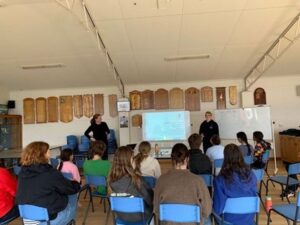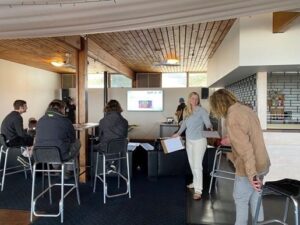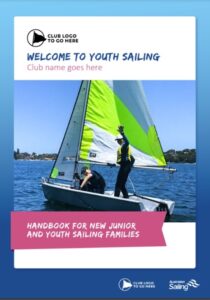Australian Sailing has announced the publication of a suite of resources to help clubs better engage with young people. Involving young people early in the club’s decision-making process, young people will feel engaged and more likely to remain at your club.
Giving young people a voice and mechanism so their voices can be heard such as to what they would like to see at your club, will also make young people feel more empowered. Remember these are your future life members and Commodores.

The suite of resources includes a guide for clubs on ‘How to Set up a Youth Committee.’ The guide covers the steps that can be taken such as ensuring the recruitment process is inclusive and open as possible, engaging not only parents but also young people directly in the initial stages. Young people will only become involved if it is their choice.
For young people joining a committee provides them the opportunity to have their say in club life, develop their leadership skills, chance to meet new people, as well as have fun. In addition, the guide offers practical advice on how to recruit Youth Committee members; by advertising through posters in club changing rooms, promoting the setting up of a Youth Committee on the club’s social media pages and newsletters, as well as talking to parents and young people directly. Clubs can begin to identify potential leaders in existing youth development squads, or amongst the club’s young instructors, assistant instructors, and coaches many of whom can become advocates that can help in turn recruit their friends. These are just some of the strategies outlined in the guide as ways to encourage young people to join the Youth Committee at your club.
When first setting up a committee think about the selection and nomination process. The ideal size of a Youth committee is 8-12 members any bigger tends to be unwieldy. However, committees with less than six representatives tend to be unrepresentative.
Be clear on the aims of the committee at the start and the reporting channels, appointing a senior mentor to help especially at the start of a committee being set up is essential. This could be a general committee member or a volunteer. As part of the suite of resources a ‘How to be a Mentor’ guide has also been developed by Australian Sailing to help any volunteers who are new to mentoring.

A clear Terms of Reference for the Youth Committee should also be written, a Terms of Reference Template is available as part of the suite of Youth resources which can be edited to suit your individual club needs.
It is also advisable to set clear roles and expectations of Youth Committee members involving them in the setting of rules around behaviour and developing a code of conduct for meetings. The earlier young people engage in planning how a Youth Committee will operate, the more likely this will reflect their needs and interests and ensure the young people will remain engaged in the process.
A guide that clubs can give to young people explaining the various roles and responsibilities of Sailing Club Officer Bearers and Committee Members is also available to aid young people in their understanding of committee structures and roles within a club.

If your club does not want to set up a formal Youth Committee yet, there are many other ways you can involve young people at your club, so they feel engaged and valued. Some of these actions are listed in the ‘Quick Wins’ checklist which provides actions you can implement quickly and easily at minimum cost and features an editable page for clubs to identify what actions can be undertaken quickly and simply at their club.
The quick wins include inviting young people to speak at events or at a presentation night, placing a youth section in your club newsletter where you can celebrate the achievements of a young member each week. Look at celebrating not just the results of races but a skill that has been mastered, or a junior that has been helpful, include photos and bite sized interviews of junior members.

Other quick wins include inviting the younger club members to take over the club’s social media pages for the day. Or simply asking young people what they want or need, why and how at your club?

Many clubs around the country are involving young people in club life with impressive results. One such club is Lauderdale Yacht Club who this season set up their first Junior committee. The Junior Committee hold monthly meetings a week before the LYC Committee so they can report back to the main committee in a timely manner. The Junior Committee has a parent mentor who supports the juniors on their ideas and encourages the Junior Committee to progress one or two ideas at a time.
To set-up the Junior Committee the club used the recently released Youth Development resources:
- How to start a youth committee at your sailing club
- Quick wins for development of Youth at Clubs
- Youth Committee Terms of Reference
- Roles and Responsibilities of Club Office bearers
- How to mentor / support Youth Committee members.
The Committee listened and learnt from the Juniors, such as about improvements to the clubhouse that the LYC Committee had not identified themselves. Some of the challenges the club found in engaging a Junior Committee was that numbers in attendance varied each monthly meetings, so ensure there are enough young people to sit on the committee and fill key roles was essential.
If your club has involved young people and you would like to share with other clubs how you have successfully engaged young people at your club and some of the lessons you have learnt, please click HERE.
As well as the recently published Youth Resources we will be releasing next month a Handbook for new Junior and Youth Sailing families. As a family new to sailing it can be daunting learning new terminology, knowing what to buy and where, how to get involved as a parent, what the options are for their child progressing in the sport.
This guide breaks down some of the myths and is fully editable for clubs to add their own information as to what they offer in terms of training courses, boats and opportunities for progression and involvement for parents.

A presentation slide pack will also be available for clubs to use to present this information face to face to parents at an information night or briefing session. The presentation will be editable, so clubs are able to customize the presentation to include their own club information.
All the Youth resources listed in the article: How to Start a Youth Committee at Your Club, Terms of Reference Template, How to Mentor and Support Youth Committees and Roles and Responsibilities of Sailing Club Office Bearers can be found on the Australian Sailing website under the new Participation hub and at the following link HERE.
Should you require any further assistance with planning or developing a Youth Committee or getting youth involved with leadership at your club, please contact your local Club Support Officer.






